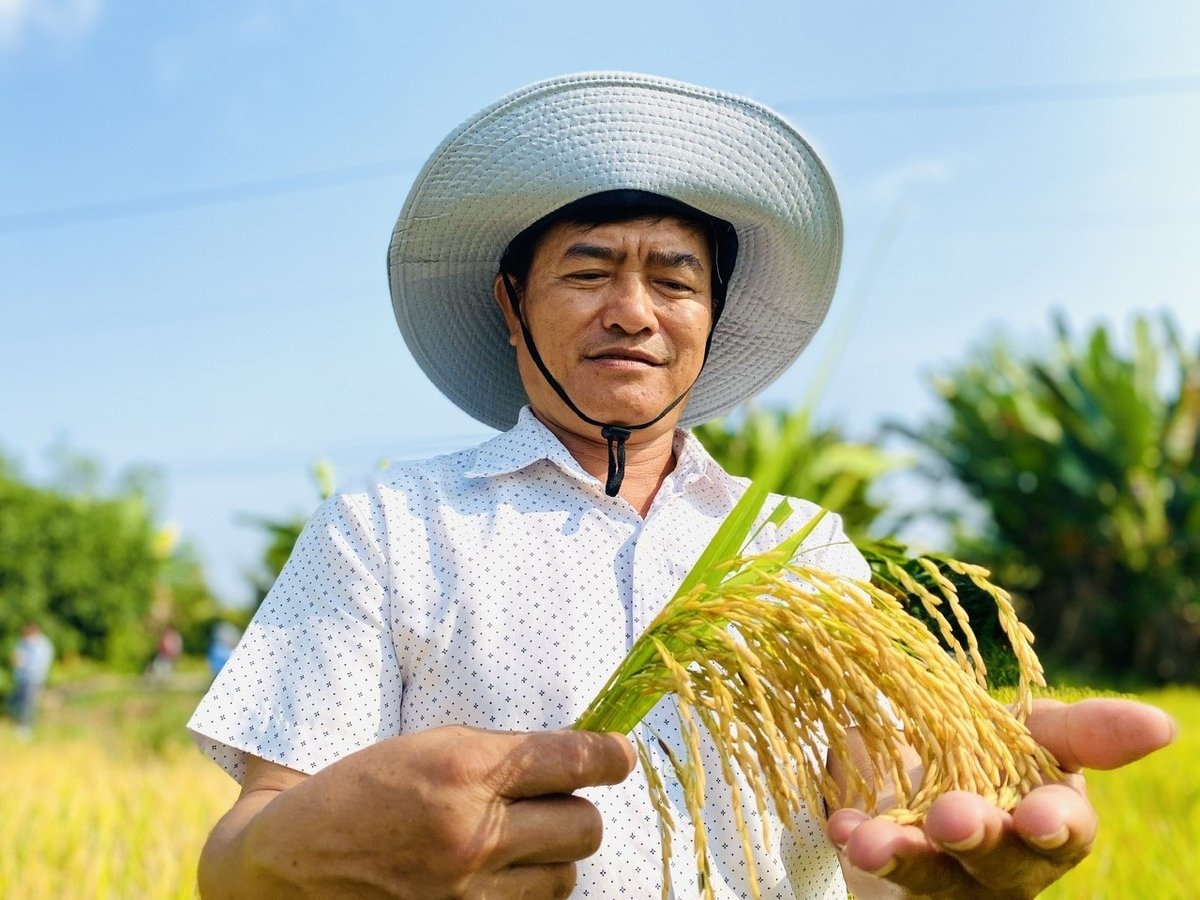May 20, 2025 | 10:28 GMT +7
May 20, 2025 | 10:28 GMT +7
Hotline: 0913.378.918
May 20, 2025 | 10:28 GMT +7
Hotline: 0913.378.918
The Netherlands Development Organization (SNV) recently conducted an award ceremony for the summer-autumn 2024 season. The ceremony recognized businesses that collaborated with rice producers to achieve three primary goals: increasing profitability, reducing greenhouse gas (GHG) emissions, and ensuring social equity.
The Australian Embassy in Vietnam and SNV are funding this activity as part of the "Transforming the Rice Value Chain for Climate Resilient and Sustainable Development in the Mekong Delta (TRVC)" project. The initiative, which spans from 2023 to 2027, is in collaboration with the Ministry of Agriculture and Environment and the Departments of Agriculture and Environment in three provinces, An Giang, Dong Thap, and Kien Giang.

Emission measuring device placed in a model field in the project. Photo: Le Hoang Vu.
TRVC encourages the involvement of businesses engaged in the production and commerce of rice in order to improve the quality of rice, decrease greenhouse gas emissions, and safeguard the environment. The initiative serves as a catalyst, expediting the transition to more sustainable rice production and business models.
An independent verification unit evaluated and summarized the performance results of each registered rice field during the initial crop cycle. The coordinated attempts of farmers and enterprises resulted in significant economic, environmental, and social benefits. In comparison to conventional methods, sustainable rice cultivation practices significantly reduced emissions.
In terms of economic performance, the project's producers achieved remarkable profits: 64% in Dong Thap, 56% in An Giang, and 54% in Kien Giang. The total reduction in greenhouse gas emissions across project sites was approximately 27,162 tonnes of CO₂ equivalent. To promote social equity, all participating companies implemented policies and practices.
Despite TRVC's initial goal of achieving a minimum of 30% profit for smallholder producers, the actual results far surpassed expectations. The average profit margin among project producers was over 59% during the summer-autumn 2024 crop.
The participating companies also distributed cash incentives to farmers. For instance, Angimex – Kitoku Co., Ltd. distributed 95% of the total bonus to all producers in its rice value chain.

Growing rice reduces emissions, reduces costs, and increases profits. Photo: Le Hoang Vu.
The initiative also awarded businesses based on performance for the first time during this crop season. By registering roughly 1,515 hectares, Chon Chinh Import-Export Co., Ltd. secured the top prize. It resulted in an average reduction of 6.57 tonnes of CO₂e per hectare in greenhouse gas emissions, and producers who participated enjoyed an average profit of 68.41%.
Christie Getman, the Country Director of SNV in Vietnam, underlined the organization's dedication to assisting Vietnam in its efforts to adapt to climate change, with a particular emphasis on the rice sector. “Through the TRVC project, we are working to support Vietnam’s Program for the Sustainable Development of One Million Hectares of High-Quality, Low-Emission Rice in the Mekong Delta by 2030. This will help farmers adopt low-emission production methods and enhance climate resilience,” she stated.
The registered project area across the three provinces has increased fivefold compared to the first crop, reaching over 33,576 hectares, as we anticipate the winter-spring 2024–2025 season (second season). This abrupt increase is indicative of the model's propensity for extensive expansion and its proven efficacy.
Translated by Linh Linh

(VAN) As a doctoral student doing research on renewable energy and electrification at Harvard University, the author shares his musings on electricity, nature, and countryside memories.

(VAN) The decree on Extended Producer Responsibility (EPR) ensures transparent management and disbursement of support funds, avoiding the creation of a “give-and-take” mechanism.

(VAN) Hue City rigorously enforces regulations regarding marine fishing and resource exploitation, with a particular emphasis on the monitoring of fishing vessels to prevent illegal, unreported, and unregulated (IUU) fishing.

(VAN) Hanoi People's Committee has issued a plan on reducing greenhouse gas emissions in the waste management sector with 2030 vision.

(VAN) Vietnam's draft amendment to Decree No. 156 proposes a mechanism for medicinal herb farming under forest canopies, linking economic development to population retention and the sustainable protection and development of forests.

(VAN) In reality, many craft village models combined with tourism in Son La have proven effective, bringing significant economic benefits to rural communities.